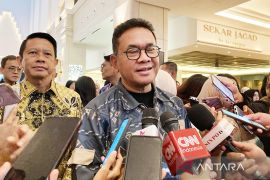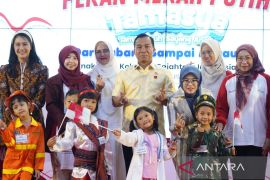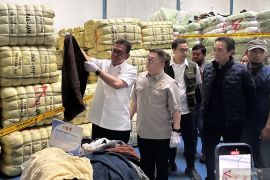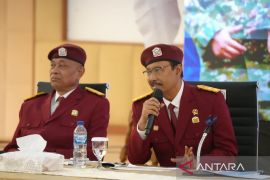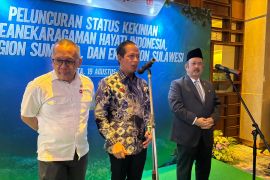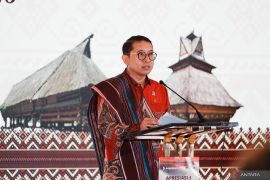"We thank them for attending the meeting and sharing knowledge, giving inputs and offering advice so that we can maintain and strengthen an atmosphere of religious harmony," Lukman said on the sidelines of the closed-door meeting with national and religious leaders in his office in Jakarta on Friday.
Chairman of the Indonesian Ulemas Council (MUI) Maruf Amun, Secretary General of Muhammadiyah Abdul Muti and Chinese community figure Jaya Suprana attended the meeting.
Also present were Indonesian Buddhist Council (Walubi) leader Suhadi Sendjaja, Indonesian Catholic Bishop Conference (KWI) representative Edy Purwanto and other noted figures such as Uung Sendana Linggaraja and representative of STFT, Driyarkarya Franz Magnis Suseno.
Lukman pointed out that the 2017 regional head elections will have two important aspects, namely democracy and integration.
While hoping that the elections would improve the quality of democracy in Indonesia, he also expected the elections to further unify and strengthen a culture of pluralism in the country.
He cautioned that the election should not lead to aggravating any divide but should unite the nation. In the event, the people should be able to address the issue of diversity in a good and civilized manner.
"We need to make religious values our basic guidelines. Religion should not destroy our sense of nationalism and religious solidarity," he counseled.
In the meantime, National Police spokesperson Insp. Gen Boy Rafli Amar called on all elements of society not to be provoked by religious or racial issues ahead of the simultaneous regional elections (Pilkada).
"We appeal to all the people not to focus on religious and racial issues. The community should not be easily provoked by SARA (ethnicity, religion and race) issues," Boy Rafli Amar stated on Monday evening.
Amar expected the elections to run smoothly and peacefully.
In addition, he urged regional head candidate pairs and their campaign teams not to use religious and racial issues during electioneering.
"The SARA issues must not be resorted to during the campaign," he remarked.
The campaign team should disseminate information and opinions to the public carefully, ensuring that conflict must be prevented.
"Pairs of regional head candidates and their campaign teams should provide information that enlightens. They should not use words that can ignite emotions," he warned.
Indonesias fifth president Megawati Soekarnoputri had earlier asked why words used by Jakarta Governor Basuki Tjahaja Purnama (Ahok) were always interpreted as spreading negative sentiments.
"Why are (the words of Ahok) always so negative?" Megawati, who is general chairwoman of the ruling Indonesian Democratic Party of Struggle (PDIP), asked at a news conference in Blitar, East Java, on Monday.
Megawati was in Blitar, together with Ahok and a number of other PDIP leaders, to visit the grave of her father, the countrys first president Soekarno, in the East Java city.
She pointed out that more than a few people were offended by the impolite words used by Ahok.
"Many people get emotional, saying Ahok talks too much. And then I told even the president, Mr Jokowi, that Ahok does have a big mouth; otherwise, he would not be from Bangka," she noted.
She reminded that people of different ethnic groups had typical characteristics. The Javanese are known to be soft spoken.
Ahok, who belongs to no political party, is the candidate nominated by the PDIP and a number of other political parties to contest the next gubernatorial election in February 2017.
Ahok is now at the center of controversy for saying words allegedly insulting to Islam when he was on a visit to the Thousand Islands in Jakarta Bay recently. He had to publicly apologize after he was reported to the police.(*)
Editor: Heru Purwanto
Copyright © ANTARA 2016

